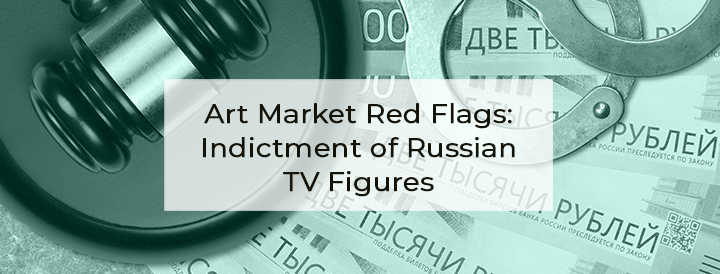- October 20, 2024
- Posted by: FCS Compliance
- Category: Art Market, Blog

Written by Rena Neville, Head of Art Division, FCS Compliance
 In a stark reminder of the importance of robust Anti-Money Laundering (AML) practices in the Art Market, US authorities have indicted Dimitri Simes, a prominent Russian state television personality, and his wife, Anastasia Simes, for violating sanctions and committing money laundering offences. The charges underscore the importance of Art Market Participants (AMPs) using their “Human AML skills” to detect breaches of global sanctions regulations, particularly concerning high-risk individuals and transactions.
In a stark reminder of the importance of robust Anti-Money Laundering (AML) practices in the Art Market, US authorities have indicted Dimitri Simes, a prominent Russian state television personality, and his wife, Anastasia Simes, for violating sanctions and committing money laundering offences. The charges underscore the importance of Art Market Participants (AMPs) using their “Human AML skills” to detect breaches of global sanctions regulations, particularly concerning high-risk individuals and transactions.
The two defendants are Mr Simes and his wife, Anastasia. Simes, a presenter and producer for Russia’s state-owned Channel One, faces charges of receiving more than $1 million in compensation, along with personal benefits, despite the broadcaster being sanctioned by the US Office of Foreign Assets Control (OFAC) in 2022.

Dimitri Simes, Credit: РИА Новости
His wife, Anastasia, is accused of using the proceeds to purchase art and antiquities for a sanctioned Russian oligarch, Aleksandr Udodov. She allegedly facilitated the purchase of fine art and antiquities on behalf of Udodov, who remains under international sanctions due to his connections to the Russian regime. These artworks were reportedly purchased from dealers and auction houses in the EU, US, and UK, and stored in the couple’s home in Virginia before being sent on to Russia. The potential penalties for such activities are severe: Dimitri and Anastasia Simes could both face up to 20 years in prison, for each count, if convicted.
How might AMPs have used their Human AML Skills to detect and avoid transacting with Mrs Simes?
The indictments do not disclose details about the specific transactions, but it is possible to imagine the scenario below. We do not know which galleries were involved or the full list of the types of objects that were purchased. Nevertheless, as part of the standard Due Diligence, it is important to understand the “nature of the transaction.” Some questions the gallery or art dealer might have asked Mrs Simes to understand the nature of her transactions include:
- Why was she buying?
- Was she buying to decorate a new home?
- Was she buying for herself or another?
Of course, these questions may well have been asked, and she may well have misrepresented the true reasons for her purchase. However, in an ideal world, the AMP would have recorded what she did say about the reason for her transactions. Documenting the reasonable belief about the nature of this transaction might help the AMP avoid law enforcement questioning their good faith.
Moreover, although she was not personally named on the sanctions list, an adverse media check might have revealed that her husband worked for Russian television and that she has ties to Russia. A curious AMP might have checked her husband’s name and discovered that he was sanctioned.
Even if his name had not been searched, given her and her husband’s ties to Russia, these facts might have triggered enhanced due diligence to uncover her/their source of wealth. The AMP may have investigated whether she personally had income or wealth sufficient to make these purchases. If she did not have an independent income, the next obvious potential source of wealth would be to explore her husband’s sources of income. Again, this might have led to running her husband’s name through the sanctions list.
For UK-based AMPs, this case highlights the importance of applying Human AML Skills to protect themselves and to avoid the significant risks of unknowingly engaging in transactions that could involve sanctioned individuals or entities.
Importance of Robust Compliance in a Globalised Art Market
The indictment serves as a stark warning that the Art Market remains a focal point for AML and sanctions enforcement globally. Earlier this year, the UK National Crime Agency (NCA) issued an Amber Alert directed at the Art Market about the risks of storing works of art for sanctioned individuals. In the UK, HMRC is responsible for ensuring compliance with AML regulations, and AMPs are required to register, conduct risk assessments, and implement appropriate AML policies and procedures.
FCS Compliance, a leading provider of AML training and consultancy for the Art Market, stresses the importance of understanding the implications of global sanctions on art transactions. With sanctions against Russian entities and individuals continually evolving due to the ongoing conflict in Ukraine, UK art professionals must stay informed and ensure their due diligence processes are up to date.
Lessons for UK Art Market Participants
For AMPs in the UK, the Simes case reinforces several key compliance takeaways:
- Know Your Customer (KYC) and Enhanced Due Diligence (EDD): It is crucial to thoroughly vet clients, especially when they are linked to high-risk jurisdictions or are Politically Exposed Persons (PEPs). Vetting clients extends beyond simple online searches and includes Human AML Skills such as understanding the nature of transactions.
- Sanctions Screening: It is important to check sanction lists to avoid involvement with sanctioned individuals or entities. (GOV.UK sanctions list here.)
- Record Keeping: Keeping detailed Due Diligence records, including the reasons an AMP is comfortable or not proceeding with a transaction, is essential.
- Training: Ongoing training for staff is key to understanding the ever-changing landscape of sanctions and money laundering risks in the art world.
As the global art market continues to grow and attract high-net-worth individuals, the risks of involvement with illicit activity also rise. Compliance with HMRC’s AML regulations is not only a legal obligation for UK AMPs but also a vital part of maintaining the integrity of the art market as a whole.
FCS Compliance offers expert-led training to help ensure that AMPs are fully equipped to navigate these challenges.
Written: October 2024

